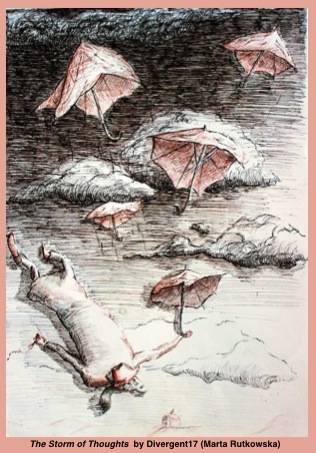 A Fairy by Arthur Rackham
A Fairy by Arthur Rackham
You don’t have to be crazy to see things that 1) aren’t really there; 2) other people don’t see; 3) are glimpses of an alternate reality; 4) all of the above and maybe a whole lot more.
I was reading an interesting article from DarkLore, Vol. 8, edited by Greg Taylor: “Dreaming While Awake: A History of Sane Hallucinations†by Mike Jay. You can read the entire article here. In it he speaks of a 90-year-old gentleman, Charles Lullin,
whose sight had been progressively failing since a cataract operation five years before [in February of 1758]…[who] began to see considerably more than he had become accustomed to. For the next several months he was visited in his apartment by a silent procession of figures, invisible to everyone but him: young men in magnificent cloaks, perfectly coiffured ladies carrying boxes on their heads, girls dancing in silks and ribbons.
His grandson, Charles Bonnet, wrote about these visions and those of others with failing sight. It became known as Charles Bonnet Syndrome.
My mother was just shy of 94 when she passed. I thank all the gods that she retained her mind and clarity, her self, until the last three weeks of her life. When she was 91, however, she had a stroke. We were “lucky†because neither her motor skills nor her speech was affected, although her balance permanently disappeared from that point. She couldn’t stand without a walker, not from muscle weakness but because she would tumble over backward without one. For a woman of her vigorous physicality and drive it was quite a frustration. However, the worst of it was that the stroke affected her eyesight: she had alternating bands of vision and blindness in each eye. The brain, confused by the input it received, often took the jumbled bits and assembled them into something that made sense to it.
My mom at first thought these visions were fact until I explained to her that I wasn’t seeing the same thing. She got so she’d say things like, “There probably isn’t a soldier in a red uniform standing in the corner, is there?†And I would allow as how I didn’t see one. I remember one time discussing with her the weird perception of waking up and not knowing where you are, thinking maybe you’re in some place you lived in two or three moves ago. Mom said that sensation had gone a step further for her: she’d wake and although she knew where everything was and everything looked the same, that the neighborhood seemed familiar, she felt as if the house wasn’t where it was supposed to be. Somehow it had moved, she knew not where. I told her, “Maybe we’ve slipped into an alternate reality and you’re the only one who realizes it.†She laughed. “Maybe so.â€
She’d wake up and lie in bed watching a parade of showgirls in full Vegas regalia promenade through her bedroom, up a staircase that didn’t exist, and through a nonexistent second story door. These things probably did not actually exist, but Mike Jay wonders, and so do I, what the true nature of hallucinations are, if no visual impairment exists, if one is not taking strong narcotics, if one is a perfectly rational human being. A significant minority of sane people do see and hear (and smell) things, as many as ten percent of the population. As Oliver Sacks says, “Seeing Things? Hearing Things? Many of Us Do†(New York Times, November 3, 2012).
Mike Jay speaks of “Lilliput sight,†where people see things much smaller than they are. And of parades of tiny people marching to and fro about the room, often ignoring or disdainful of attempts by perceivers to communicate with them. A friend of mine who was a paranormal researcher told of a highly proficient office manager and “nice lady,†who told him that every night for a month, little trooping fairies climbed up her bedspread, marched across the bed, then climbed down the other side and disappeared under the bed. She was too afraid to get up and look under the bed. And as suddenly as the phenomena started, it stopped. A temporary brain fugue? Maybe. But it sounds all too familiar, doesn’t it? Like many of the fairy stories of old.
But, although many of the percipients of odd things in such books as Lady Gregory’s Visions and Beliefs in the West of Ireland or W. Y. Evan-Wentz’s The Fairy Faith in Celtic Countries were elders, a significant number were not. Or going blind. Or sots. Or craaaazy. The brain undoubtedly generates chimera, trying to make sense of bits of disjointed experience. These things may exist completely inside a rational mind, conjured up by misfiring synapses, odd perception, or neurological fugue.
Or maybe they aren’t. Maybe the doors to perception do open at random intervals and people catch a glimpse of numinous tides, of What Could Be, or What Is in some universe Over There.










